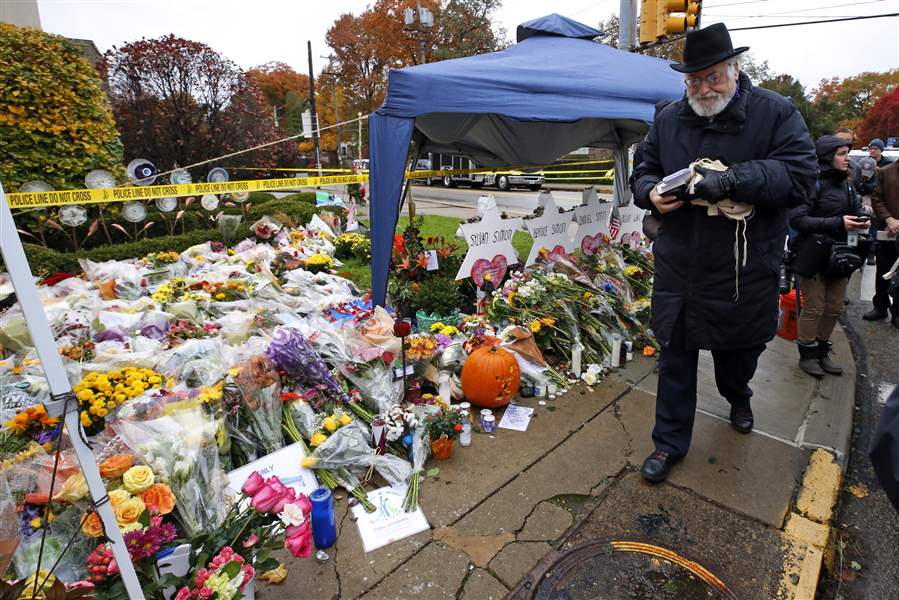
Solidarity, love the only way past hateful violence
11/5/2018
Rabbi Chuck Diamond walks past a memorial to Tree of Life Synagogue Saturday, Nov. 3, 2018 in Pittsburgh, a week after 11 people were killed and six wounded when their worship was interrupted by a gunman's bullets.
ASSOCIATED PRESS
The massacre at a synagogue in Pittsburgh stunned people in this country and elsewhere in the world. Most people reacted with revulsion on hearing the news irrespective of their individual religious affiliations. To carry out such a heinous crime inside a place of worship — and while the congregants were at prayers — crosses all bounds.
Robert Bowers, the accused shooter, wanted all Jews to die. His hatred of Jews was fueled and encouraged by the extreme right elements in the Republican Party such as the alt-right and Ku Klux Klan. When one is on a mission of hate, history and suffering of the perceived enemy become irrelevant. That Jews have been one of the most persecuted religious minorities in history did not matter.
Religious intolerance has long been part of human experience. When evil narratives flourish without any scrutiny or challenge, they erode the very foundations of decency, tolerance, and acceptance. It is all too common to point an accusing finger at others for one’s own incompetence and impotence. Scapegoats are convenient.
While people are in a hurry to apportion blame on individuals for such acts, they forget that such individuals are encouraged and sustained by many more who make it their mission to malign, minimize, and degrade a people, a faith, or a tradition.
It is an open secret that the extreme right in this country do not hide their hatred of blacks, Jews, foreigners, and just about any one who is not like them.
This was evident in Charlottesville, Va., a year ago in August when at a white nationalist rally a Toledo-area driver plowed through a crowd of peaceful counter-protesters, killing one and injuring others. The participants of the rally carried anti-Semitic signs and shouted anti-Semitic slogans. At the time President Trump said that there were good people on both sides.
Mr. Trump has been of late calling himself a proud nationalist. Perhaps for political convenience he does not call himself white nationalist, but one can see through the flimsy and clumsy facade. To be against anti-Semitism and not be against the KKK and alt-right is sheer hypocrisy.
When our leaders become the mouthpieces of the right-wing propaganda, not many of their followers have the ability or intelligence to differentiate between a Muslim and a Sikh or tell the difference between the vast majority of law-abiding Muslims and terrorists who claim to be Muslims.
By his own admission Randolph Linn, an Indiana man, was swayed by the anti-Muslim rant on Fox News and decided to torch the Islamic Center of Greater Toledo in 2012 to avenge the perceived grievances put in his head by the talking heads on right-wing radio and television. The man is currently serving a 20-year sentence in a federal penitentiary.
The outpouring of love, concern, and sympathy by the people of Pittsburgh and by the people of conscience across the country and the world is heartwarming. Shared grief cannot bring the innocent victims back but it can reassure the members of the Jewish community that they are not alone facing the evil of intolerance. As Edmund Burke had aptly said: All that is necessary for the triumph of evil is that good men do nothing.
Despite many hurdles placed in the way of the Jewish people in this country, they have persevered and have made a place for themselves in American society. And they have added to the strength and vibrancy of this country.
They are in the forefront of philanthropy, public service, humanities, and the arts. There was a time, in the not-too-distant past, when they were restricted from joining country clubs, refused admission to professional schools, and denied the right to buy homes in better neighborhoods. Those are things of the past but vestiges of that hate and discrimination still linger on.
And that blanket hatred and acts of violence affect, above all, our children. As Rabbi Jason Miller of the local Congregation B’nai Israel (quoted by the New York Times) said, “[the children] don’t understand why people hate Jewish people.
They are scared about the security situations at the synagogues, Jewish summer camps, and Jewish community centers. I have been trying to calm their fears and encourage them to feel pride for being part of the Jewish community.”
The pain inflicted in Pittsburgh is a shared pain and is felt by most of us. Solidarity in the face of evil is the only way forward.
S. Amjad Hussain is an emeritus professor of surgery and humanities at the University of Toledo. His column appears every other week in The Blade. Contact him at: aghaji@bex.net.